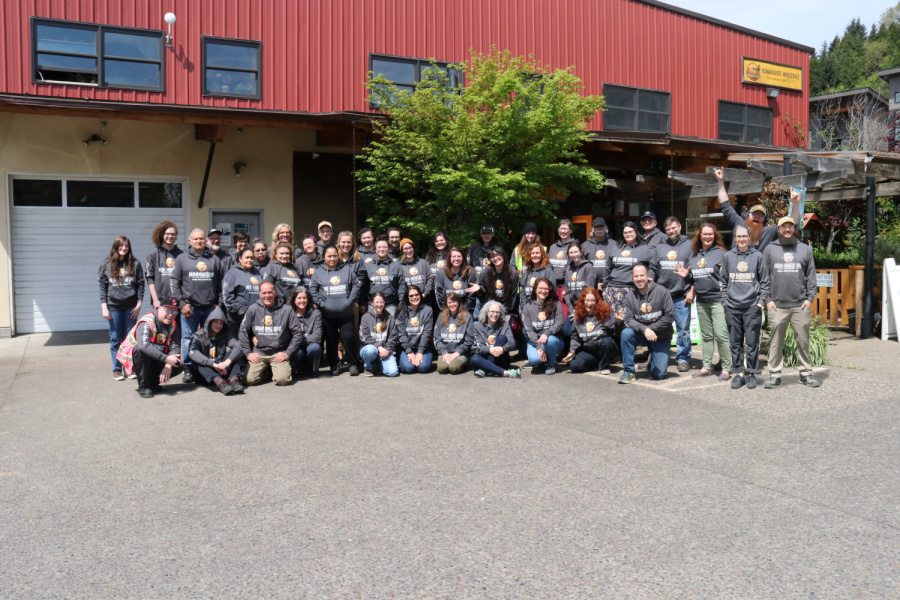Owners ensure their vision for supporting organic farming in Oregon continues for generations.
Hummingbird Wholesale recently announced plans to transition to an Employee-Owned Purpose Trust (EOPT), which gives ownership to a Purpose Trust, operated by a board of employees and external representatives. This structure is intended to ensure that the vision of Charlie and Julie Tilt, who have owned the Eugene-based organic food distributor for 20 years, continues beyond their tenure as owners. It includes bylaws that ensure the ongoing dedication to “organic, high-quality, nutritious foods grown as locally and sustainably as possible” and “maintains environmental, social, and economic sustainability.”
Oregon Business spoke to Charlie Tilt about the vision he and Julie have seen realized, and how an EOPT will protect that vision and support the employees that have been so central to the success of Hummingbird so far.
After 20 years of running Hummingbird Wholesale, what inspired you to consider transitioning to an EOPT?
When Julie and I took the Small Business Class from Lane Community College’s Small Business Development program over 17 years ago, one of the takeaways was that every business owner needs an exit strategy. We considered selling to individuals we know, having one of our daughters take over, and even just selling to an investor — but were not able to find a good fit with these options. So I did a deep dive into employee-owned business strategies and discovered that the EOPT model would [be] an opportunity to uphold the current mission and values of the company we had worked so hard to build, while also putting the most important asset of the business—our coworkers—in the driver’s seat as owners.
Importantly, the EOPT does not require a specific decision-making structure and allows us to create a management approach that fits our business and allows for that approach to continue to develop over time.
Ultimately, what made this transition right for Hummingbird Wholesale?
Hummingbird has played a certain role in increasing the market and supply chain for Certified Organic food grown in the Pacific Northwest, which includes a regional distribution focus. We have a unique mission and culture that prioritizes long-term relationships, environmental health, and the kind of daily work that allows us to support life-sustaining farming and farmers. We have a dedicated and extraordinary set of coworkers who work hard and care about what they do at work. The EOPT transition allows those coworkers the opportunity to experience ownership and be direct beneficiaries of the financial outcomes that the company creates through their shared efforts. The benefit to Julie and me is that we are able to have an exit strategy that meets our financial needs, while protecting the future for our team and providing a company direction that will continue to provide value for the many customers, farmers, vendors and partners with whom we work.
What has the transition process looked like so far?
It took about a year and a half in total to come up with the final plan that we implemented in January of this year. We hired a company that specializes in employee ownership (Project Equity) to help us evaluate our options and provide resources, so we could complete this project while continuing to manage daily work demands. A small team of coworkers formed a Transition Team to evaluate the options for governance and decision-making, which took about seven months. With the change in ownership in place, we will need to focus in 2023 on building our understanding of how the new structure works and implementation of a new governance structure.
Tell us about your employees and why you’ve chosen to entrust them with the future of this business?
Julie and I see business as a means to meet the needs of people and to be of service. A focus on improving the environment and offering service — in our case, healthy food and a smile to our customers, and fair returns and respectful treatment for suppliers and farmer partners — naturally leads to an interest in ensuring that coworkers have a safe and respectful work environment and are getting a fair share of the profits.
It turns out when you have a meaningful mission and you treat coworkers like owners, the business attracts extraordinary individuals who are a delight to work with. The EOPT creates a model of governance and ownership that more closely aligns with and supports this outcome.
Becoming an EOPT ensures that your legacy will be preserved. Can you tell us what you consider your legacy to be?
There are two parts to this answer, one that I am proud of and the other is a bit embarrassing. The business legacy Julie and I wish to be preserved is the way that, as a profitable business, Hummingbird has sought to better our society’s common opportunity for a healthy community and world. Specifically, we believe how we get our food and what we eat is a critical activity to get right so we have a healthy future. There is plenty of work to do in this area, so we would like to see Hummingbird continue with that effort.
The second part, which maybe other owners will recognize, is that it would be wonderful if all that effort over the years, many hours of time, many challenges faced and decisions made, has a future that outlives us and continues to do good — to keep on contributing even after our time has passed.
Over the last 20 years, can you remember a time when that legacy felt clear? A time when you saw your vision for Hummingbird Wholesale realized?
There have been a whole series of those experiences! Farmer Appreciation events at Hummingbird that farmers traveled hundreds of miles to attend, our first abundantly successful crop of Organic pumpkin seeds grown in the Willamette Valley, the flour we could offer from grain grown in the PNW and ground at a local mill that we supported, being able to offer locally grown wholesale food to local schools for kids’ lunches, seeing coworkers grow and develop their careers, speaking engagements to share about farming and the impacts of agricultural practices, now having three organically-certified cleaning facilities in the state of Oregon that can clean beans and grain (there were none when we started) – the list is long!
What has been the biggest challenge to that vision/legacy?
What any rational owner will likely admit — the biggest challenge is always the owner’s competency and self-understanding in conjunction with what they don’t know about business. When Julie and I started, we were the only workers in the company. Today, there are 48 coworkers. We have learned that having a vision will cost you your complacency, sharpen your realism, and allow you to overcome ignorance and obstacles — if you want it badly enough.
You’ve mentioned that it’s important that Hummingbird Wholesale “maintains environmental, social, and economic sustainability and acts as a force for good in the food system.” How do you hope to see Hummingbird Wholesale acting as a force of good in the food system moving forward?
Internally, Hummingbird will remain an independently owned company in perpetuity, directed by its purpose and owner members to consider the impacts of its policies and practices on the environment, and on people.
I would say our current focus to act as a force for good is necessarily on our coworkers and suppliers as a response to the economic and worker consequences from the past three years. We will continue to support a regional and national increase in acres under organic certification, as that has proven beneficial for clean air and water, and the health of farm communities and consumers.
We are working to refine Oregon’s plan for supporting organic acreage through business planning and increased support for organic farmers.
Why do you think more small businesses don’t become EOPTs? It seems pretty rare.
The model is more common in Europe, but recent changes in tax law have made the model more useful in the United States and I expect we will see a significant increase in the number of businesses that choose this model, especially as younger workers expect to have a greater say in business outcomes and need more than a paycheck to want to contribute.
What will it like to no longer be owners of this business you’ve run for so long?
Great question! I will continue to be an active part of the business for the foreseeable future, but I can already say that I have to be intentional at giving away control and unilateral decision making power. I have been setting my sights firmly on trusting that shared responsibility with a group of dedicated individuals will have far better outcomes than I can achieve independently. It helps to keep in mind a vision of what the company can be in 100 years, to remind me how to behave in it today.








